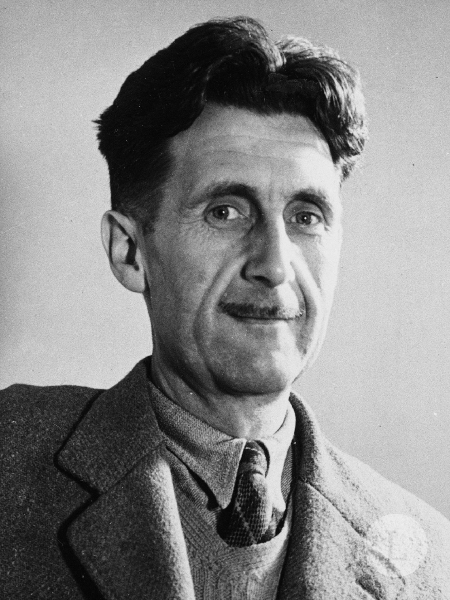
born: JUNE 25, 1903
died: JANUARY 21, 1950
nationality: ENGLISH
movement: TRANSCENDENTALISM, DYSTOPIA FICTION
George Orwell, born Eric Arthur Blair, was an English author and essayist renowned for his influential novels 1984 and Animal Farm. Orwell’s works are characterized by their exploration of themes such as totalitarianism, social injustice, and the power of language. Through his novels and essays, Orwell left an enduring impact on literature and political thought.
EARLY LIFE AND FAMILY BACKGROUND
Orwell was born on June 25, 1903, in Motihari, British India, to Richard Walmesley Blair, a British civil servant, and Ida Mabel Blair. In 1904, his mother brought him and his sister to England, where they settled in Henley-on-Thames. Orwell’s early experiences of the British class system would later inform his writing.
Orwell attended St. Cyprian’s preparatory school and, later, Eton College. After completing his education, he chose not to attend university, instead joining the Indian Imperial Police in Burma. His experiences in colonial Burma influenced his views on imperialism and inspired his novel Burmese Days.
WRITING CAREER AND LITERARY STYLE
Orwell began his writing career as a journalist, contributing to various newspapers and magazines. He also worked as a teacher, bookshop assistant, and war correspondent during his lifetime. His first novel, Down and Out in Paris and London, was published in 1933 under the pen name George Orwell.
Orwell’s literary style is characterized by his clarity, wit, and exploration of complex political and social themes. His works often address the dangers of totalitarianism, the impact of poverty, and the importance of free thought.
TOP 10 BOOKS BY GEORGE ORWELL
1984 (1949)
Orwell’s iconic dystopian novel depicts a totalitarian regime that controls every aspect of its citizens’ lives, exploring themes of censorship, surveillance, and the power of language.
Animal Farm (1945)
This allegorical novella uses a group of farm animals to satirize the events leading up to the Russian Revolution and the early years of the Soviet Union. It serves as a powerful critique of totalitarianism and political corruption.
Down and Out in Paris and London (1933)
Orwell’s first novel chronicles his experiences living in poverty in both cities, offering a vivid and unflinching portrayal of the lives of the working poor.
Homage to Catalonia (1938)
A memoir detailing Orwell’s experiences fighting in the Spanish Civil War, this work provides a firsthand account of the political turmoil in Spain and offers a critique of both fascism and communism.
Burmese Days (1934)
Inspired by Orwell’s time in Burma, this novel examines the impact of British imperialism on both colonizers and the colonized, addressing themes of racism, corruption, and the destructive nature of colonial rule.
Keep the Aspidistra Flying (1936)
This novel follows the life of Gordon Comstock, a struggling writer disillusioned with the pursuit of money and materialism, as he attempts to live a life of creative freedom.
The Road to Wigan Pier (1937)
A non-fiction work that documents the lives of the working class in the industrial north of England, highlighting the harsh realities of poverty and social injustice.
A Clergyman’s Daughter (1935)
This novel tells the story of Dorothy Hare, the daughter of a clergyman, who experiences a loss of memory and finds herself in a series of challenging situations, ultimately questioning her faith and the societal expectations placed upon her.
Coming Up for Air (1939)
Set on the eve of World War II, this novel follows George Bowling, a middle-aged insurance salesman, as he reminisces about his idyllic childhood and grapples with the uncertainties of the future.
Inside the Whale and Other Essays (1940)
A collection of Orwell’s essays that cover a range of topics, including politics, literature, and social issues. These essays showcase his keen observations and insightful analyses of contemporary society.
INTERESTING FACTS
- Pen Name Origin: Eric Arthur Blair chose the pen name George Orwell as a tribute to the River Orwell in Suffolk, England, which was a favorite location of his.
- Spanish Civil War: Orwell fought on the Republican side during the Spanish Civil War, joining a Marxist militia group. He was wounded in the throat by a sniper’s bullet, which left him with a lifelong speech impediment.
- World War II Service: Orwell served in the Home Guard during World War II, participating in the defense of Britain against possible invasion.
- BBC Employment: Orwell worked as a producer for the British Broadcasting Corporation (BBC) during World War II, focusing on propaganda and cultural broadcasts for India.
- Animal Farm’s Publication Struggle: Despite its later success, Animal Farm was initially rejected by several publishers due to its political content and criticism of the Soviet Union.
ORWELL’S DEATH AND LASTING LEGACY
George Orwell passed away on January 21, 1950, at the age of 46, from tuberculosis. Though his life was tragically cut short, his literary legacy has continued to flourish. Orwell’s works, particularly 1984 and Animal Farm, have become emblematic of the dangers of totalitarian regimes and the importance of individual freedom.
Orwell’s exploration of themes such as censorship, propaganda, and social injustice remains relevant today, and his novels continue to be widely read, studied, and adapted. His clear writing style and insightful analysis of political and social issues have solidified his place as one of the most influential writers of the 20th century.
In addition to his literary contributions, George Orwell’s life serves as a testament to the power of conviction and commitment to one’s beliefs. As we reflect on Orwell’s life and works, it is evident that his impact on the literary world and his ability to create thought-provoking stories will ensure that his legacy endures for generations to come.
